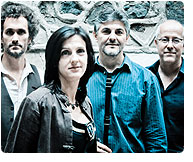|
|
 |
 Distant Migrations, Close Voices:
Distant Migrations, Close Voices:
Vlada Tomova Sings at the Urbane Edge of Tradition on Tour this Fall and on Balkan Tales
All roads lead to the Balkans, and Bulgarian-born, Brooklyn-based singer Vlada Tomova hears it.
The region welcomed mysterious wanderers from Inner Asia; Greeks and Romans trading in the East; bands of weary migrants on a road that stretched from Rajastan to Andalusia. The lines of ancient movement across the peninsula are audible and tightly bound to one another, like the lives in a village.
Embracing sounds far outside the confines of tradition, Tomova has distilled years of learning songs from traditional singers and modern songwriters to tell Balkan Tales (Kuker Music; October 18, 2011). Her arrangements fearlessly embrace flamenco flourishes and Indian resonances, Brazilian flair and Romany rhythms. Yet her mutable, flexible voice evokes the stark, rich spirit of Balkan mountainsides and byways, the old paths and deep roots of thousands of years of cultural conversation.
Joined by globetrotting kaval (traditional Bulgarian flute) master Theodosii Spassov and an avant-worldly band including alter-sitarist Chris Rael, Tomova brings this elegant balance to New York, Boston, and Chicago in late October 2011.
“The Balkans have something very unique that mixes well with other musics because of its complex and long history,” explains Tomova. “And it’s very emotional for me; it’s about connecting to the places, the ancient villages I’ve loved since childhood. It’s about home.”
***
Tomova recalls sitting at a modest kitchen table on a recent song-finding trip to Bulgaria. She had brought the members of her choir, Yasna Voices, to a remote pomak village, people whose ancestors had converted to Islam. There, Tomova and the American vocalists had met up with a pair of singers who were the real deal.
Across from her sat two older women who had been life-long singing partners. Traditionally, two girls start finding the close, vibrating intervals of old songs together and will continue blending their voices until death do them part. They could feel each other’s timing without a glance, sense what to say as the other improvised lyrics.
This commitment and intimacy moved Tomova deeply. “Those two women were so close, and they relied so much on each other, in an unspoken, down-to-earth, unquestioning way, which you could hear in their singing, the two voices flowing together as one,” Tomova reflects. “I wish we could find much more of that kind of interdependence, trust, and connectedness in the different layers of our everyday life today, especially in large cities, and in the Western world.”
The layers of Tomova’s own life reveal a similar spirit of interconnection. Though raised around traditional music in her native Bulgaria, she and her generation rebelled against the state-sponsored folk heard on the airwaves. It wasn’t until Tomova came to Berklee to study jazz that she discovered a completely different approach to Bulgarian and Balkan traditions, an approach that began with a spontaneous song at a Boston party and ended with concerts at Carnegie Hall and musical trips to the Bulgarian countryside.
Not content to simply sing the roots—though she is now an accomplished and respected performer and singer of Bulgarian traditional music—Tomova often collaborates with other globally-minded musicians (like Balkan Beat Box) and lends her mutable, expressive voice to installations, from a recent King Tut exhibit to the Turin Winter Olympics.
The delicious tension between tradition and bold experimentation echoes in Tomova’s songs like the close intervals loved by Bulgarian singers. It vibrates in the flamenco guitar and hand percussion that reframes the traditional Bulgarian tune, “Momche,” and in the Greek-gone-Brazilian ballad to a beloved daughter, “Augoustos.”
A set for Tomova’s Balkan Tales is just as likely to include a Russian gypsy ballad as an edgy sitar line, or to follow a full-throated village song with a complex, globally savvy extrapolation of a folk-inspired jazz number. Take “Women’s Dance,” a tune composed by Milcho Leviev, an eccentric and brilliant musician defector from socialist Bulgaria whom Tomova tracked down in Los Angeles.
Tomova’s unexpected arrangements evolved in close collaboration with her fellow musicians at Berklee and in New York’s vibrant scene, as well as from Tomova’s own feel for vocal color, ornamentation, and distinctive harmonies. This fall, the band will include Spassov, a wildly talented traditional flute player who can easily leap borders and genres; he’s worked with everyone from Indian tabla innovator Trilok Gurtu and flamenco piano star David Peña Dorantes to film music icon Ennio Morricone.
On one of his many world tours, Spassov showed up at one of Tomova’s shows and jumped in to jam with her band, and a musical friendship began. “I’ve wanted to play with Teodosii again for years,” Tomova smiles.
The diverse sounds and multifaceted musicians Tomova has brought together reflect not only the complex interchange between peoples across the Balkans; they also resonate with Tomova’s new roots in a global metropolis.
“I have dug deep into Balkan music, but I also have all these other parts in me now,” Tomova notes. “And wherever I go, even if I’m back singing in that small village somewhere in Bulgaria, I bring those other worlds with me. My band and our performances reflect that.”
<< release: 10/18/11 >>
|
|
 |
|
|
|